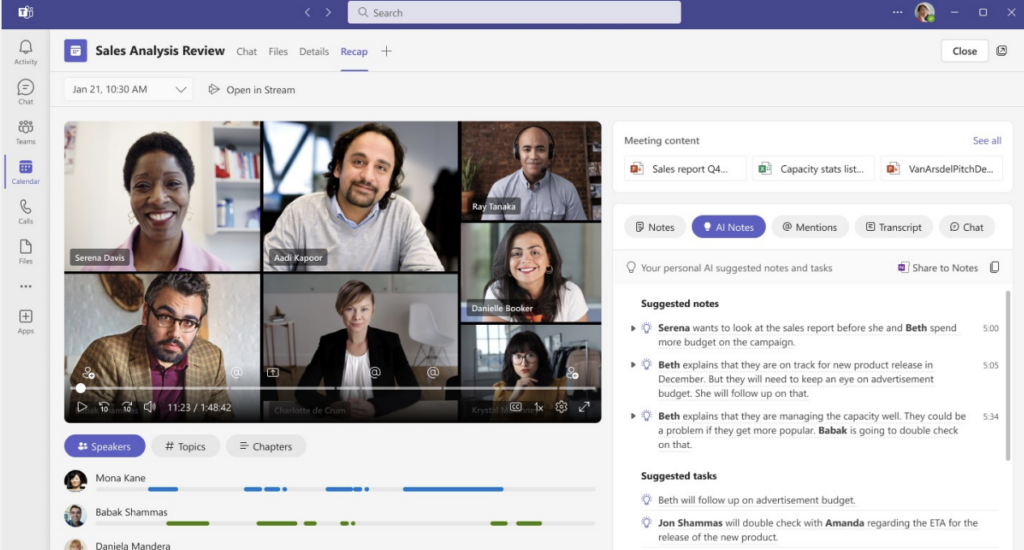
Microsoft is integrating the technology behind OpenAI’s hugely successful chatbot ChatGPT into Teams as part of a new premium offering.
The AI will be used to simplify meetings, including automating notes and recommending tasks based on conversations had during the call. It comes as OpenAI launches its own ChatGPT premium plan and a new report revealed the tool had 100 million monthly active users in January, making it the fastest-growing consumer application in history.

The premium plan will cost $7 a month in June and then rise to $10 a month in July, according to Microsoft. This is the first product announcement from Microsoft incorporating the chatbot technology since it took a further $10bn stake in OpenAI and confirmed it would offer the API through its Azure cloud service.
OpenAI’s chatbot will run when someone starts a meeting but can also be used to help create a template that matches the needs of the meeting organiser. It will include an intelligent recap that automatically generates notes and personalised highlights to “help you get the information most important to you” even if you didn’t attend the meeting, according to Microsoft.
“Built on the familiar, all-in-one collaborative experience of Microsoft Teams, Teams Premium brings the latest technologies, including Large Language Models powered by OpenAI’s GPT-3.5, to make meetings more intelligent, personalised, and protected—whether it’s one-on-one, large meetings, virtual appointments, or webinars,” said Nicole Herskowitz, VP of Microsoft Teams in a statement.
ChatGPT will also generate chapters in the recording of a meeting to divide it into sections, generating titles for each section and descriptions to make it easier to find the most relevant aspects. It can also add ‘personalised timeline markers’ only visible to the user to show when they left or joined a meeting and highlight when a specific name was mentioned.
ChatGPT will aid branding and customisation
As ChatGPT improves, so will its use within Teams, according to Herskowitz. “Soon, these personalised meeting highlights will expand to include speaker timeline markers that show you who spoke during the meeting, when they spoke, and allow you to jump to that moment. Speaker timeline markers are intelligently organised by who you work most closely with, so you’ll never miss feedback shared from your manager in a meeting again.”
Microsoft says automated chapter markers and personalised timeline markers are available in PowerPoint Live through Teams today, with other features including an intelligent recap, notes and generated tasks will be added in the second quarter of this year.
Teams premium will also include live translations generated from the captions that can translate between 40 spoken languages with captions shown in the users’ language of choice. For this to work only the organiser of the meeting needs to have paid for Teams premium – then everyone in the meeting can select their caption language of choice.
Other Teams features will include branded meetings with backgrounds and logos changed to those of the company hosting the meeting, a wider range of templates and user policy packages, as well as watermarking and recording limits.
Microsoft says it is also rolling out Microsoft Purview Information Protection sensitivity labels for Microsoft 365 E5 that also have Teams Premiums, allowing organisers to apply the most relevant and important meeting options based on the sensitivity of the meeting content.
ChatGPT Premium and 100 million users
As other companies look to monetise the potential behind ChatGPT, OpenAI announced plans for a premium subscription service that will ensure faster response times, priority access to new features and general access to ChatGPT even during peak times.
ChatGPT Plus has been in development since the start of the year, after the success of the generative AI tool took its creators by surprise. The $20-a-month subscription will be available to US-based customers initially with plans for a wider rollout in the near future.
Free access will remain but OpenAI said it felt the need to offer subscription packages to ensure it could still justify the cost of offering a free tier. It will also continue to learn from how users interact with the tool to improve its functionality, reliability and performance.
“We launched ChatGPT as a research preview so we could learn more about the system’s strengths and weaknesses and gather user feedback to help us improve upon its limitations,” the company said in a statement. “Since then, millions of people have given us feedback, we’ve made several important updates and we’ve seen users find value across a range of professional use-cases, including drafting and editing content, brainstorming ideas, programming help, and learning new topics.”
OpenAI says in the future it hopes to expand the premium offering based on user feedback. This could include lower and higher cost plans, data packs, business plans and wider availability. The ChatGPT API is also expected to be available for third-party developers to create their own tools, likely priced on a ‘per-use’ basis in the same way other OpenAI APIs are managed.
There is a potentially large customer base ready to pay the subscription. A recent study by UBS, reported by Reuters, found that the tool reached 100 million monthly active users in January. That makes it the fastest-growing consumer application in history. The study was based on data from Similarweb which found ChatGPT had about 13 million unique visitors per day in January, double the December figure and just one full month after it was launched.






